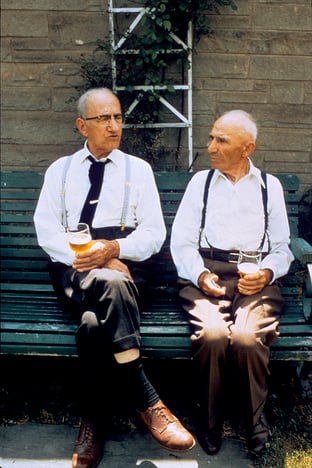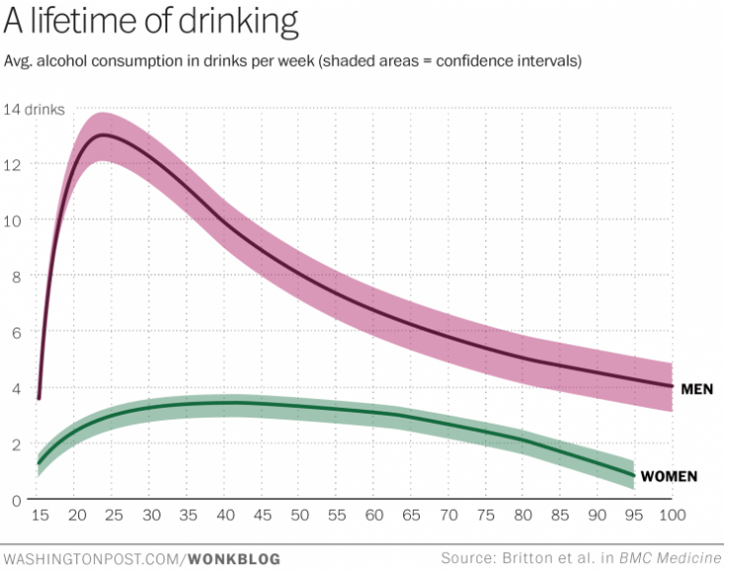
Back in 1987, the National Council on Alcohol and Drug Dependence (NCADD) began sponsoring an annual Alcohol Awareness Month in April. Its purpose was to reduce stigmas associated with alcoholism by increasing the national dialogue about recovery.
According to the National Institutes of Health (NIH), 55.2 percent of Americans over the age of 65 drink alcohol. So, today, we thought it might be in keeping with the spirit of Alcohol Awareness Month to talk about the potential consequences of alcohol abuse for seniors, and examine how older people can enjoy alcohol responsibly.
The surprising statistics on alcoholism in Ohio’s seniors.
According to the United Health Foundation and statistics provided by the US Centers for Disease Control and Prevention (CDC), 5.7 percent of Ohio’s seniors reported abusive drinking behaviors, including binge drinking or chronic drinking (eight or more drinks per week). Although that’s slightly below the U.S. average, it’s still problematic.
Middle-class Ohio seniors suffer the highest prevalence rate of alcoholism — 8.3 percent of older Buckeyes with an annual household income between $50-75,000, compared to just 4.5 percent of Ohio seniors making less than $25,000 a year. Although rates are roughly similar for rural vs. urban seniors, older suburban Ohioans exhibit a slightly higher rate of problem drinking behaviors.
Older men (7.1 percent) are more likely to report problem drinking than older women (4.4 percent). More white Ohio seniors (6 percent) report problem drinking than Ohio seniors of color (4.8 percent).
And, counter to oft-repeated assumptions and stereotypes, seniors with lower education levels (2.7 percent of those with less than a high school diploma; 5 percent of high school grads) are less likely to exhibit problem drinking than older Ohioans with some college (8.1 percent).
That said, most otherwise healthy older adults can enjoy alcohol, when done so in moderation. If you choose to indulge, there are some special considerations you should bear in mind and precautions you should take.
Older people are more susceptible to alcohol’s effects.
In general, aging lowers a person’s tolerance for alcohol. Some research has suggested this might be because, generally, seniors’ bodies retain less water than younger adults’ bodies. With less water in a senior’s body to dilute the concentration of alcohol in the blood, the effects of alcohol may be more acute for him or her than they were in youth.
Aging also makes one more vulnerable to alcohol’s negative health consequences. For example, it’s well known that drinking affects a person’s balance and increases the risk of falling. For seniors, though, falls are very dangerous — they result in serious or life-threatening injuries more often in elderly people than they do in younger adults.
Alcohol interacts poorly with many medications that older people commonly take. Those include:
 Aspirin
Aspirin
- Acetaminophen (Tylenol)
- NSAID pain relievers (Advil, Aleve, Celebrex)
- Antihistamine allergy medicines (Benadryl, e.g.)
- Cold and flu medicines (especially those that, like NyQuil, contain diphenhydramine)
- Cough syrups (especially those containing codeine, which is a narcotic)
- Sleeping pills (both the prescription and over-the-counter kind)
- Prescription pain relievers (never drink in tandem with opiate medications, including morphine, Tramadol, Percocet, Oxycontin, Dilaudid, hydrocodone, oxycodone, or fentanyl)
- Anti-anxiety medicines (Xanax, Klonopin, Valium, Ativan, Restoril, benzodiazepines, most drugs ending in -pam or lam)
- Antidepressants (SSRIs like Prozac and Zoloft, SNRIs like Effexor and Cymbalta, and / or tricyclic medications)
- Blood pressure medications (especially those that lower blood pressure)
If take any of these, or take several medications on the regular, even small amounts of alcohol could cause serious problems. Talk to your doctor to find out whether it’s safe for you to enjoy the occasional adult beverage.
It’s critical that seniors not abuse alcohol.
Alcoholism increases one’s risk of developing liver disease, heart disease, many forms of cancer, and other serious illnesses. It’s strongly associated with clinical depression.
Less commonly known to the average senior is that chronic drinking inhibits nutrition absorption in the gut. For older people — especially those who have calcium deficiencies — this can increase the risk of developing osteoporosis (bone density loss), which would subsequently make serious fall-related injuries more likely. Inhibited nutrient absorption can also lead to electrolyte imbalances, which might manifest as dizziness, delirium, or even life-threatening heart arrhythmias.
Lastly, chronic drinking damages the lining of the stomach and intestines, causing ulcers. Left untreated, ulcers can worsen to the point that they cause intestinal bleeding, which can be deadly for people who take blood thinners, or intestinal perforations, which can cause septic shock.
If you choose to drink, do so safely.
Most healthy seniors can enjoy the occasional adult beverage without incident or worry. But, if you binge drink or use alcohol to deal with negative emotions, you might have a problem with alcohol abuse.
If so, know there are plenty of people willing to help you recover and stay safe. Talk with your spouse, your loved ones, your friends and/or your doctor about getting the support you need. Inpatient alcohol rehab programs, and outpatient recovery programs like Alcoholics Anonymous, have helped many seniors overcome addictions to alcohol, and they could help you, too.
You’re valued. You’re loved. And we want you to continue living well.













